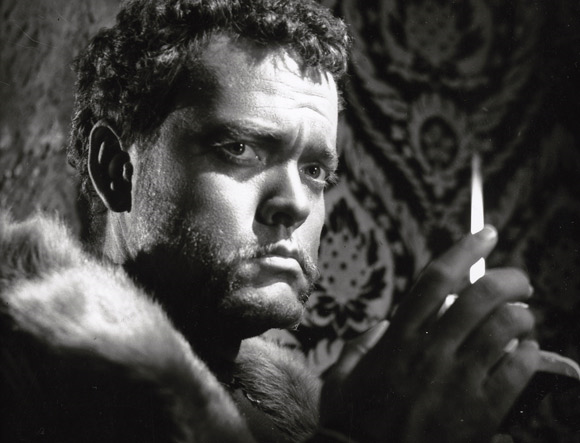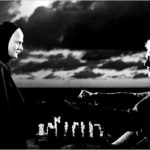Orson Welles, the cinematic genius who ended his days selling cheap wine, was both noble and feeble, titanic and pathetic, sacred monster and profane clown, says Peter Conrad. We take samples from his oeuvre, his noir thriller The Stranger and his stylistic fragmentation, Othello.
Orson Welles’ The Stranger (1946) – Full Movie
From Faust to Falstaff
By Peter Conrad, Published in the Observer, Guardian UK
“I always have to be larger than life,” Orson Welles once said. “It’s a fault in my nature.” For me, those two contradictory sentences — a boast followed by an apology — sum him up and explain what made him such a fascinating and perplexing subject for a book.
Welles, acclaimed as a genius while still a teenager, wanted to be a great man. Not content with an artistic career, he toyed with the idea of running for political office and gave up only because he thought that a divorced man could never be elected President. But though he spent his life impersonating warlords, tyrants and imperialistic tycoons, he was never sure if he possessed greatness or merely grandiosity, a by-product of his looming bulk and his booming voice. Eventually, as that confession about the fault in his nature conceded, he came to see his own overreaching as a moral flaw.
Welles’s fundamental and lifelong story is that of a big man who gets his comeuppance. He himself was a big man who, in repeatedly filming his own downfall, displayed a kind of emotional masochism, a delight in his own humiliation, that he veritably trumpets in “Othello.” — Richard Brody in the New Yorker
In his early twenties he played Faust, the sacrilegious superman in Marlowe’s tragedy, but he ended his life as Falstaff, the lazy toper in his film of Shakespeare’s histories, Chimes at Midnight. Nursing his poodle Kiki, the elderly Welles ate for free at a Los Angeles restaurant which fed him because he attracted out-of-town customers, who came to gape; he cashed in his reputation by advertising Danish lager, Californian wine, Japanese whisky and bestowed that oratorical, authoritative voice on a brand of chocolate pudding.
STORY: Ingmar Bergman: A Tenuous Searching Faith in “The Seventh Seal”

Was Welles a tragic hero, martyred by the bureaucratic hacks who mutilated his films? He preferred to see himself as a comic figure and joked that he began at the top and then conscientiously worked his way down. This ironic defense covered his misery as he begged funds from dodgy backers for films he seldom managed to complete. Like Othello or Lear, he was simultaneously noble and feeble, titanic and pathetic, a thunder-god and a spoiled child, a sacred monster and a profane clown.
Hitchcock, my previous subject, is somehow smaller than his work: great as they are, the films derive from his vengeful perversity, which takes pleasure in transforming reality into a nightmare. Welles is not only larger than life but larger than his work and his excessiveness is not a fault in his nature because it testifies to his recklessly generous creativity. Like a tree scattering seeds, he had more ideas than he could ever realize; as trees do, he donated his abundance to the air. No wonder he compared Falstaff to the oaks and flowering chestnuts that grew in Merry England.
Othello is a formidable intellectual achievement; Welles made it over the course of three years, earning money as an actor and channeling his pay into another few days of shooting. The fragmentation of the shoot is reflected in the fragmentation of the images, which is no mere expedient but an aesthetic, a fragmentation as complex as that of a rapid montage by Eisenstein, but one that runs not on synthesis or analysis but on dissolution—the shattering of a mind and of a world. — Richard Brody in The New Yorker
The dramatist Thornton Wilder urged him to have “capsule conversations,” but Welles went on talking. One boozy night while filming Othello, he treated his Iago, Micheál MacLiammóir, to a discursive romp through cultural history, during which he exploded the notion of the Renaissance. Next day, the details eluded the hung-over MacLiammoir: how I would love to know what Welles said. But, remembering the sly assessment of Leonardo, the Borgias, and the alliance between villainy and culture that he wrote for Harry Lime to deliver in The Third Man, it’s possible to guess the contents of this brilliant impromptu lecture. Welles, suspicious as ever of his own myth, was a Renaissance man who disapproved of the Renaissance.
STORY: Pier Paolo Pasolini: A Subversive Champion of the Disinherited
Othello – Orson Welles, 1952
Denied money, self-sabotaged by his chaotic working methods, Welles completed only a dozen films. While writing, I could not help fantasizing about the films he didn’t make, which – since his creativity is contagious – we can screen in our imaginations. His tantalizing pitches amount to a kind of conceptual art. Years before his film of Macbeth, made in an inky coalmine left over from a western, he dreamt up an adaptation of the tragedy that would be, he said, a cross between Wuthering Heights and The Bride of Frankenstein: Shakespeare filmed by flashes of lightning.
He proposed setting the New Testament in the deserts of Utah and New Mexico, to find out if Christ would redeem America. While married to Rita Hayworth, he suggested Carmen and Salome as vehicles for her. His Carmen was to be brutish and unmelodic, as if Prospero Merimée’s novel had been rewritten by James M. Cain; in Salome, Welles was to play both the lecherous Herod and also Oscar Wilde, reveling in his decadent assault on religion.
After their divorce, Hayworth went on to play both characters, but without Welles’s idiosyncratic directions the films were tame, sanitized things. Her Carmen takes care to marry Don José before having sex with him and her Salome, a good girl at heart, escapes execution with the help of a hunky centurion who has converted to Christianity and is last seen mistily listening to the Sermon on the Mount.
At the end of his life, still grieving over the abrupt, cozily sentimental ending the studio grafted on to The Magnificent Ambersons, Welles thought of returning to the film and attaching an epilogue in which the original actors would reappear, 30 years older. Now, confirming the narrative of decline and decay, the erosive effects of time would be written on the faces of the cast. It was a Proustian inspiration, but it could not be done: some members of the company were already dead, so art once more was outwitted by mortality.
Before Citizen Kane, Welles planned an adaptation of Conrad’s Heart of Darkness, in which, examining and arraigning his own mystique, he was to play both Kurtz the murderous genius and Marlow the representative of civilized values. The studio cancelled the project, but Welles, who often accused himself of being a violent and regressive barbarian like Kurtz, made his Heart of Darkness by subterfuge in later films. It is there in the jungle picnic among the predators in The Lady from Shanghai and in a lost sequence (cut by the studio and discarded) from The Stranger, when a Nazi fugitive goes to ground in a fetid, swarming city in equatorial America.
Read the entire essay at The Guardian.
Peter Conrad’s Orson Welles: The Stories of His Life is published by Faber.
Related articles
Updated 31 January 2024














Mac Talley:
“Touch of Evil, Magnificent Ambersons, Mr. Arkardin, and of course Citizen Kane. Classics.”
Doug Lucchetti:
“Whatever Orson was, he was orders of magnitude superior to whoever this Conrad fellow was.”
Jack Eidt
Thanks, Doug. I used Conrad’s essay as a way of getting at the character of Welles in the landscape of film and Hollywood of the 40s and 50s. Who Conrad was remains decidedly outside of the frame.
Pingback: Beat Generation Dreams of John Cassavetes | WilderUtopia.com
Pingback: H. G. Wells on the Futurist Dystopia of Fritz Lang’s “Metropolis”